- Home
- Tim Powers
Forced Perspectives Page 13
Forced Perspectives Read online
Page 13
Harlowe knew little more about the Chronic group than that, but he had recognized the coloring-book Ba image as a clever initiator of minds, and over the course of several months he had succeeded in buying half a dozen copies of Groan from various rare book dealers. The image differed slightly but crucially from the image of Ba in reference books on Egyptian mythology, and was segmented like a figure in a stained glass window. It was necessary that an initiate spend at least a minute staring at the image steadily, concentrating on it, for it to fully replicate itself in the initiate’s mind—like installing software that took a while to load—and a person who colored in all the spaces on that page would inevitably have stared at the image for at least the necessary amount of time.
Harlowe had stared at the image himself, and after no more than a minute had felt what he had only been able to describe as a faint electrical current in his mind, and it had proved to be as persistent as tinnitus. He had given his Singularity team only the sketchiest account of the old failed egregore, and had never mentioned Conrad Chronic to any of them, but he had made them, too, look at the image on that page of the coloring books. The only other after-effect any of them had noticed was that the scarcely-perceived mental vibration was stronger if two or more of them stood in close proximity to one another.
And then Harlowe had given copies of the coloring book to the twins, along with a box of crayons. The twins had taken to the task readily, though they had insisted on coloring all the pages of the book in order, and had wasted a day meticulously coloring caricatures of people like Lyndon Johnson and Earl Warren. But at last they had arrived at the page with the Ba image on it—and when they had simultaneously colored in the last segment of it and dropped their crayons, they had been silent for the rest of that day.
They were different, after that.
Even before that initiation with the coloring books, they had sometimes been able to induce actions in people around them: Harlowe had sometimes found himself fetching Cokes they had wanted but not asked for, or unable to speak if they were absorbed in watching a movie on TV; . . . and when encouraged, he had discovered, they could even force two people at once to do something they would never voluntarily do.
And after their initiation, they had seemed to expand, psychically—he was always aware now of their mercurial mentation as something like a shrill, indecipherable twittering in a corner of his mind—and they had sporadically been able to describe people and events far removed from their own experience.
They had, in fact, made him aware of Vickery and Castine.
“There’s two strangers tangled up in your spiderweb,” one of them had remarked nine months ago, in January. “They drove a truck into Hell and flew a glider back out, and now their clocks are no good.” The other twin had added, “Their kite strings are looped around yours.”
Uneasy, Harlowe had put out inquiries among a few of the occultists in Los Angeles, and had soon learned that two people, Sebastian Vickery and Ingrid Castine, had reportedly driven a taco truck, of all things, into some sort of afterlife in May of last year, and had come back, alive; though without the truck. From other sources he had learned that at least one LAPD detective had covertly consulted Vickery on a few cases, because Vickery was apparently now able to step out of the present moment and see events of the recent local past.
And it had occurred to Harlowe that, if Castine too had acquired this ability, the pair of them would be better IMPs than the twins—and would almost certainly be more rational.
The twins were still looking out the starboard window, now humming two sustained, unharmonious notes; the faint perception of their jiggling thoughts, usually ignorable, was like an itch at the back of his mind. Harlowe frowned and looked away.
At least the attempted capture of Vickery in February had secured the unique copy of The Secret Garden.
He had tracked down Vickery through the man’s employer, Anita Galvan, who ran fleets of taco trucks and supernatural-evasion cars; but from her he had learned, too, of that book. When she had demanded five thousand dollars to deliver Vickery, and Harlowe had refused to pay it, she had said, Maybe it’s worth it to you since he has a book with a never-born spirit fossilized in it? It’s a daughter the eunuco never had the balls to beget. The brujas say there’s uses for such things.
Harlowe had gone away and had in fact consulted a Hispanic medium. And then he had gone back and given Galvan the five thousand dollars.
It seemed likely that Harlowe would be able to subsume the ghost of an actual person, too, into the book, blend it there with the . . . spirit? failed likelihood? . . . of the daughter Vickery never had. The resulting irrational juxtaposition of that “pair” should, it seemed to Harlowe, compellingly attract any ghosts that might otherwise be drawn into the emerging egregore, where their animate absences would psychically cripple it. The augmented book would ideally function like cadmium rods in nuclear reactors, which absorb excess neutrons and prevent meltdown.
The five thousand dollars had not been wasted, even though Vickery had got away.
And Vickery and Castine could still be the reliable communication organ of the egregore gestalt; and their “kite strings,” incorporated into it, would surely provide added strength to the whole. Ragotskie stole the bloody sock yesterday, but Harlowe had long ago covertly installed in the car of each member of the ChakraSys staff a GPS tracker, charged from the car’s battery, and Taitz and Foster were even now out following him. Their instructions were to wait until, ideally, Ragotskie located Vickery and Castine with the aid of the sock, and then kill Ragotskie and capture them. No stops or delays.
That was admittedly a long shot—but Harlowe had taken the twins out on the boat this morning in the hope that they might themselves be able to locate the fugitive pair.
Nine months ago Lexi and Amber had sensed Vickery and Castine, but hadn’t been able to tell where they might be. But that had been when the twins were in a city, among hundreds of people whose free wills were always distorting the moment of now. Out here on the empty face of the sea, though, the chronocline plane would be pretty genuinely flat, not the usual averaging-out of an infinity of fractal time-spikes. The five people on the boat, especially with the twins practically being one person, shouldn’t appreciably distort the flatness of local time. If the twins could determine the actual location of Vickery and Castine, it would most likely be from the psychic calm out here.
A crunching noise from the other side of the lounge now caught Harlowe’s attention. The twins had grown tired of peering out the starboard window at the ocean and had tipped up their empty cups to get the ice cubes,and were chewing them vigorously.
“Welcome little fishes in,” said one of the twins, “with gently smiling jaws!”
More Alice in Wonderland stuff. Harlowe wasn’t sure what to make of their obsession with that passage from the Lewis Carroll book; Harlowe had never been able to make any sense of the Alice books himself.
“When do we touch the two people who drove to Hell?” said the other.
“Touch?” said Harlowe. “Oh—soon. When we stop the boat. And you’ll look around then, right? See what they’re seeing, see where they are.”
“Uh huh.” The girl set her empty cup on the deck. “Uncle Simon, can we go up to the bow? We want to see what kinds of fish fly.”
Harlowe opened his mouth, but his tongue wouldn’t move. He nodded emphatically so that they’d release him, and then said, quickly, “If you put on life jackets!” Sweat had broken out on his forehead.
“Semper ubi sub ubi.” It was a joke of theirs, apparently learned from their late father: Latin for Always where under where. Ho ho.
They scampered out onto the cockpit deck, and a moment later he saw them run along the narrow side-deck past the starboard windows.
Tony was up on the fly bridge, and Harlowe sighed and picked up the intercom microphone. “Tony, see that they put on life jackets, okay?”
Tony’s reply came over the speaker: “Righ
tie-O.”
Rightie-O. Shit. Harlowe stood up and stretched. He could see Agnes Loria out in the cockpit, bundled up in a blue nylon parka. She was leaning against the transom and squinting into the eddying headwind, and he buttoned his wool coat and stepped out onto the broad fiberglass deck. The smell of the open sea on the wind was a pleasant change from the climate-controlled blandness inside.
He crossed the deck and stood at the rail a few feet away from Loria, and he too turned to face forward, for the rising sun over Seal Beach was directly astern.
Loria was wearing sunglasses now, but Harlowe remembered that her eyes had been red, with dark circles under them, when she had joined him for coffee in the little breakfast nook below. She had spent the night with the twins in the forward vee-berth cabin, and evidently the girls had had a couple of nightmares. At least they always had them together, he thought, and didn’t stagger them.
“They could,” Loria said now, “have made me jump over the side. In the middle of the night.” She pulled a pack of Marlboros and a lighter out of her jacket pocket and hunched over, cupping her hands around the lighter.
“Oh, don’t be melodramatic.” Harlowe frowned impatiently. “Make you walk down the hall, up the steps, through the lounge—” He waved at the white deck they were standing on, “—across the cockpit to the rail? And over?” He chuffed an exhalation and shook his head, trying to express more skepticism than he actually felt. “So okay, once they made you open a bag of tortilla chips—”
Loria had got her cigarette lit, and smoke fluttered out of her mouth as she spoke. “They were angry. Those chips went all over the place.”
He raised his hand. “—And then they made you hold their hands yesterday. Those are momentary—”
“Hijackings.”
“Momentary.”
For several seconds neither of them spoke. The roar of the engines was louder out here.
“You could have Tony kill the engines any time,” Loria said. “This is as unpopulated an area as you’ll find.”
Harlowe looked out at the rippling expanse of blue sea. Loria was right. The irregular line of Catalina Island was easily ten miles away, and the mainland waterfront lay at about the same distance to the northeast. The nearest boat, a catamaran under full sail, was several miles off and tacking toward Catalina.
“Maybe Vickery and Castine drove all night,” said Loria. “Maybe they’re in Salt Lake City or San Francisco by now.” She took a long drag on the cigarette and then pitched it over her shoulder, into the boat’s spreading wake. “I don’t think Elisha could follow them all that way, just with that silly sock. You think the twins will be able to perceive them clearly enough to . . . I don’t know, see what they see, share their space?”
“It’s worth a try. I think our fugitive pair is partly in alignment with Lexi and Amber already.”
“Oh?”
“Yesterday the twins caused a black hole incident at the beach, by holding hands—do you remember what that family said?”
“Uh—no.”
“You told me they were babbling about getting new clothes in Hesperia. That’s north of here, on the way to Las Vegas or Salt Lake City, and it would make sense for Vickery and Castine to think of ditching the clothes they were wearing, in case we’d managed to plant radio frequence tags on them.”
“You think it was their thoughts that drunk family picked up? But if—”
“I think it’s possible. Likely, even. The twins pointed them out to us in the first place, remember—sensed them. And if it was their thoughts that the twins were picking up yesterday, it means Vickery and Castine are impinging on us, but uninitiated. They’re—” He frowned, then waved at the deck under their feet, “—they’re like a boat on an intersecting course with our luxury liner, as it were. We’ve got to get them to line up parallel—and permit boarders.”
“Or sink them?”
Harlowe shrugged, irritably. “If necessary. If possible.”
“The Vickery guy did kill Platt.”
“Who’s got time for vengeance? I hope they can still be an asset.”
“How did,” Loria began, but a yell and splash from up by the bow interrupted her—and the faint, shrill agitation at the back of Harlowe’s awareness abruptly ceased.
Loria stepped away from the transom to grip the starboard rail with one hand. “Man overboard!” she yelled, pointing out at the water; her arm was moving from left to right. “Both twins overboard!” she added.
From up on the fly deck came a yell from Tony: “Hang on everybody!” The engines roared as the boat sped up, leaning to port.
Salt spray stung Harlowe’s eyes. He slipped on the fiberglass deck and grabbed the transom rail, and he frantically probed his mind; but the ordinarily-constant awareness of the twins’ thinking was gone.
Harlowe blinked around at the sea and the shoreline. “He’s going the wrong way!” he gasped.
“He’s looping around to come back,” said Loria, her arm still extended. “Go up and show him where I’m pointing.”
Harlowe scrambled across the deck and started up the ladder to the fly bridge, and nearly swung off it when the boat shifted ponderously over to starboard and spray from that direction blinded him. Up on the wet fly bridge deck at last, he crawled on his hands and knees to the back of the pilot chair, then stood up and squinted down over the rail. He couldn’t see two heads in the water at all, but he saw Loria down on the cockpit deck and pointed in the same direction that she was.
“They’re there!” he yelled at Tony, who was hunched over the wheel. “Are they wearing life preservers?”
“No,” said Tony, “I told ’em—”
“Hurry.”
The deck vibrated under Harlowe’s tennis shoes, and the bristly Long Beach skyline was crawling from right to left across the horizon. Loria’s arm swung like a compass needle as she hurried across the deck to the port side, and now she was pointing exactly abeam. Tony pulled the shift lever to neutral, and after a few seconds he switched off the engines and clicked the shift lever into gear.
Harlowe gave him a furiously impatient look.
“Stops the propellers,” Tony explained breathlessly. “And we’re between them and the wind—we’ll drift closer.”
Tony ran back and slid down the ladder to the cockpit deck. Harlowe followed carefully; and he was dizzy with relief when the faint chatter of the twins’ mental activity was suddenly restored.
Loria had sailed a life ring like a frisbee out across the water, and now threw another. Light nylon lines snaked behind them.
When the rings slapped the water, Harlowe could see the twins’ heads, a dozen yards away; and he began to relax, tentatively, when the saw their hands grab the rings. Evidently this had not been another suicide attempt. The nylon lines sprang taut, throwing bright drops, as Tony and Loria began pulling the twins in.
“Fetch the ladder!” called Tony over his shoulder. His sunglasses had fallen off, and sweat glittered in his brush-cut blond hair. Harlowe could see the man’s shoulder muscles flexing under the white T-shirt, and Loria had one knee braced against the gunwale as she pulled her line in.
Fetch? thought Harlowe; but he ran halfway forward and lifted the hook-topped aluminum ladder from its bracket and hurried back to where Tony and Loria stood.
The twins were only ten feet away now, their legs and bare feet kicking behind them, and Harlowe hooked the ladder over the railing at the point they seemed to be approaching; and within no more than a minute they had both climbed up and swung over the rail, and now they stood dripping and shivering on the deck while Loria hurried below to get blankets.
Harlowe stared at both of them as his heartbeat slowed down, and at last he turned to face Tony.
“I told ’em,” Tony protested again, but one of the twins interrupted.
“We needed,” she said haltingly, “to be all the way under, and life jackets don’t even let you get your hair wet.”
“You’re lucky you didn�
�t stay underwater!” said Harlowe. He took a deep breath. “You think you could have joined the egregore from the bottom of—”
“It was,” began one of the twins; “new,” finished the other. “It’s how you get out of your way,” added the first, with a look of reproach. “We had to give ourself away to it, just for a minute.”
Loria had reappeared with two blankets bundled in her arms, and she draped one over each of the twins. “Now go below,” she told them, “and get into some dry things.”
The twins padded through the door into the lounge, and Harlowe waited until he heard their feet thumping down the steps to the lower deck, and then turned to Tony.
“I’m sorry, Mr. Harlowe,” the young man said hastily, “you know how they—”
“I know how they,” said Loria. “Get back up on the bridge, Tony.”
“You want me to start up again? We could—”
“No,” said Loria. “This is perfect. Let’s just sit a while.”
With one last anxious look at Harlowe, Tony turned and clambered back up the ladder.
When he had disappeared forward, Loria said, “He’s more loyal than you deserve, you know.”
“Oh, he’s a good man, beyond doubt,” admitted Harlowe, stepping back to the transom rail. “A devoted member—if a bit simple. He does feel terrible about Elisha stealing the bloody sock out of the Tahoe yesterday, when he was left to guard it.” Harlowe absently rattled the transom door. “It was damn negligent of him.”

 Expiration Date
Expiration Date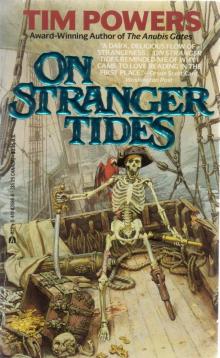 On Stranger Tides
On Stranger Tides Earthquake Weather
Earthquake Weather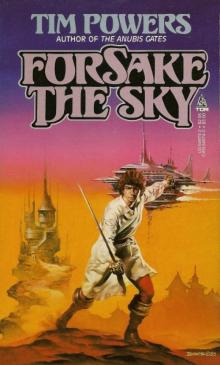 Forsake the Sky
Forsake the Sky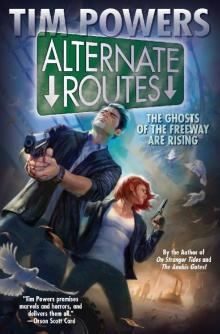 Alternate Routes
Alternate Routes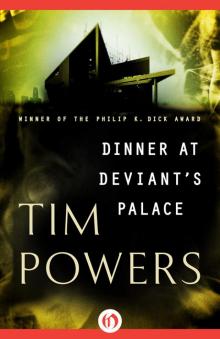 Dinner at Deviant's Palace
Dinner at Deviant's Palace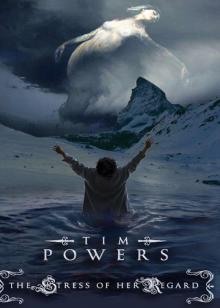 The Stress of Her Regard
The Stress of Her Regard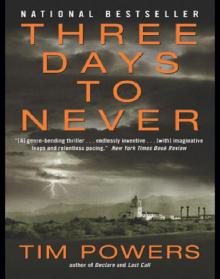 Three Days to Never: A Novel
Three Days to Never: A Novel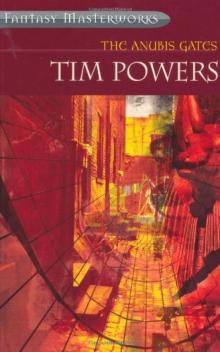 The Anubis Gates
The Anubis Gates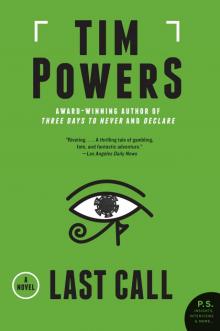 Last Call
Last Call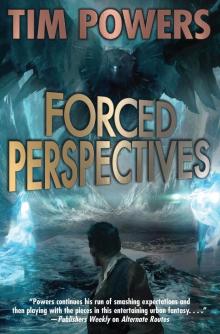 Forced Perspectives
Forced Perspectives Strange Itineraries
Strange Itineraries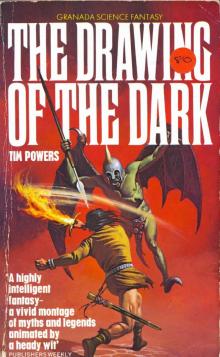 The Drawing of the Dark
The Drawing of the Dark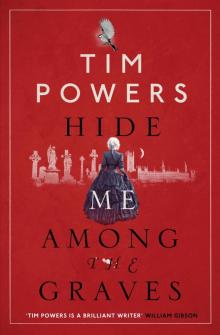 Hide Me Among the Graves
Hide Me Among the Graves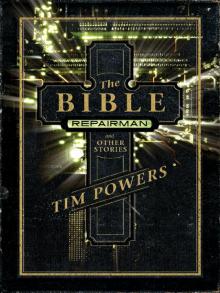 The Bible Repairman and Other Stories
The Bible Repairman and Other Stories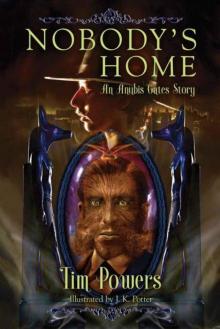 Nobody's Home: An Anubis Gates Story
Nobody's Home: An Anubis Gates Story More Walls Broken
More Walls Broken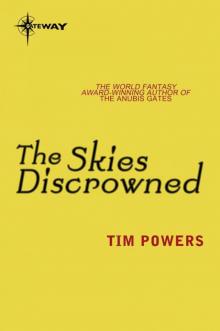 The Skies Discrowned
The Skies Discrowned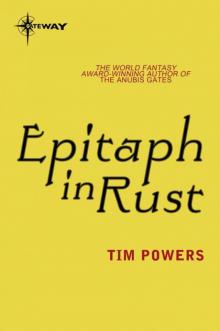 Epitaph in Rust
Epitaph in Rust Skies Discrowned and An Epitaph in Rust
Skies Discrowned and An Epitaph in Rust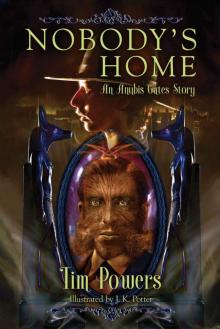 Nobody's Home
Nobody's Home Drawing of the Dark
Drawing of the Dark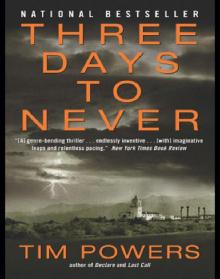 Three Days to Never
Three Days to Never